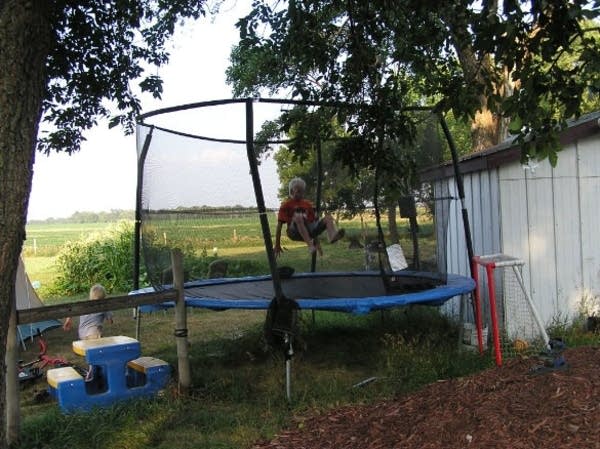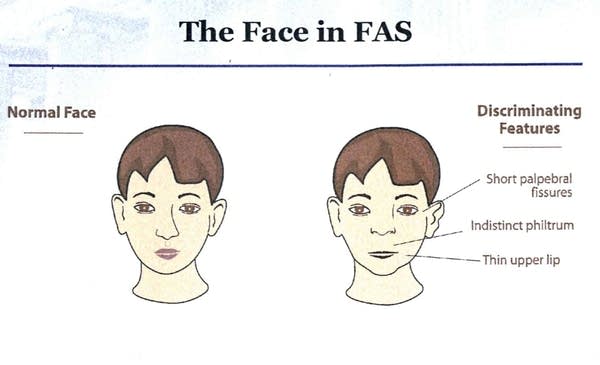'It's like we're raising drunk kids'
Go Deeper.
Create an account or log in to save stories.
Like this?
Thanks for liking this story! We have added it to a list of your favorite stories.

Doug and Denise Finnell have four adopted children. The kids were taken from their biological mother because she abused alcohol during her pregnancies. The oldest child, their daughter, is in a teen detention center.

Their other three children, all boys, live with the Finnells. As the Finnells sit in the yard of their rural home near Lennox, South Dakota, Denise describes her children this way.
"It's like we're raising drunk kids. It's so true," she says.
The yard is a blur of activity. There are bikes, there is a trampoline and there's a pool -- and they're all getting good use.
Turn Up Your Support
MPR News helps you turn down the noise and build shared understanding. Turn up your support for this public resource and keep trusted journalism accessible to all.
The three brothers look alike with blond hair and blue eyes, but their personalities are distinct. Lucas, who is 4, bounces from one activity to another. Anthony is 8 and he's a thinker. He likes boats and the bugs he finds in their country yard, and smashing walnuts.
Matthew, the oldest boy, is 11. Like his brothers, he's small for his age. He has the stereotypical facial features of fetal alcohol syndrome. His eyes are set close together and the skin between his nose and mouth is flat. But it's his behavior that's most concerning.

Denise and Doug Finnell say when something doesn't go the way Matthew wants, things can go bad, quickly.
"It all boils down to the fact that he's frustrated and he doesn't know how to verbalize something, or doesn't like it when he's failing," Doug says. "His IQ is up there, but he struggles socially with fetal alcohol."
"His mind just stops and we tell him he has to turn it on," says Denise.
The Finnells say Matthew can be mouthy and mean. Matthew describes what's happening in his brain a little differently.
"For fun I kind of like to screw around. But it always gets me in trouble because I kind of get a little hyper after I get worked up," Matthew says. "When I get hyper I just can't think straight and I go flying around the house. I try to stop, but I just can't."

Matthew and Lucas both have full fetal alcohol syndrome. Anthony's diagnosis is alcohol-related neurological defects, somewhat less severe on the spectrum of FAS disorders.
The Finnells consider themselves lucky that their boys' cognitive abilities are good enough for them to learn basic skills. Denise says they can read a book and tell you about it two months later. But they can't apply what they know.
For example, Matthew can read a recipe and tell you what it says. But, Denise says, he can't understand how to make the cookies.
The same is true for their behavior. Denise says it's difficult to discipline the boys because nothing works for long. Rewards and punitive measures aren't successful, because those techniques require an understanding of cause and effect -- and that's what children who were exposed to alcohol don't have.

Denise says it's easy to sum up her boys' personalities by the way they watch television together.
"Anthony is a sober kid, and he can watch something and process it and say, 'Oh, that was funny.' Matthew and Lucas? They'll watch the whole thing, and Lucas will be rolling on the floor belly-laughing, and Matthew will ask why it happened and we'll have to explain every piece. Now the third time he's (Matthew) watched it he might laugh," Denise says.
Denise and Doug Finnell laugh often about their children and how they behave. Their sense of humor helps get them through each day.
But when the frustration grows and the boys' behavior is uncontrollable, the Finnells open up a cupboard door in their kitchen. Inside, there's a picture of two brain scans. One has normal ridges and valleys, the other is smooth. The smooth brain is the brain of someone exposed to alcohol before birth.
That picture reminds the Finnells their children can't help how they behave.



